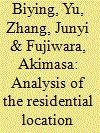| Srl | Item |
| 1 |
ID:
112913


|
|
|
|
|
| Publication |
2012.
|
| Summary/Abstract |
It is expected that the residential location choice and household energy consumption behavior might correlate with each other. Besides, due to the existence of self-selection effects, the observed inter-relationship between them might be the spurious result of the fact that some unobserved variables are causing both. These concerns motivate us to (1) consider residential location choice and household energy consumption behavior (for both in-home appliances and out-of-home cars) simultaneously and, (2) explicitly control self-selection effects so as to capture a relatively true effect of land-use policy on household energy consumption behavior. An integrated model termed as joint mixed Multinomial Logit-Multiple Discrete-Continuous Extreme Value model is presented here to identify the sensitivity of household energy consumption to land use policy by considering multiple self-selection effects. The model results indicate that land-use policy do play a great role in changing Beijing residents' energy consumption pattern, while the self-selection effects cannot be ignored when evaluating the effect of land-use policy. Based on the policy scenario design, it is found that increasing recreational facilities and bus lines in the neighborhood can greatly promote household's energy-saving behavior. Additionally, the importance of "soft policy" and package policy is also emphasized in the context of Beijing.
|
|
|
|
|
|
|
|
|
|
|
|
|
|
|
|
| 2 |
ID:
107497


|
|
|
|
|
| Publication |
2011.
|
| Summary/Abstract |
It is expected that in-home and out-of-home energy consumption behavior in a household might be correlated with each other, probably due to the existence of household budget constraints. Ownership and usage of energy-saving technologies for in-home appliances (or vehicles) might lead to the increase in out-of-home (or in-home) energy consumption. It is therefore necessary to jointly represent in-home and out-of-home energy consumption in the same modeling framework. With this consideration, we first build a new type of energy consumption model based on the Multiple Discrete-Continuous Extreme Value (MDCEV) modeling framework. Next, we conducted a questionnaire survey in Beijing in 2009 and successfully collected the information about households' energy consumption, ownership/usage of in-home appliances and vehicles, and households' and their members' attributes from 1014 households. Throughout an empirical analysis, it is confirmed that the MDCEV model is effective to simultaneously describe the in-home and out-of-home energy consumption behavior. In addition, it is revealed that a set of household and personal attributes affect the ownership and usage of in-home appliances and vehicles. Furthermore, it is shown that the unobserved factors play a much more important role in explaining energy consumption behavior than the observed attributes of households and their members.
|
|
|
|
|
|
|
|
|
|
|
|
|
|
|
|